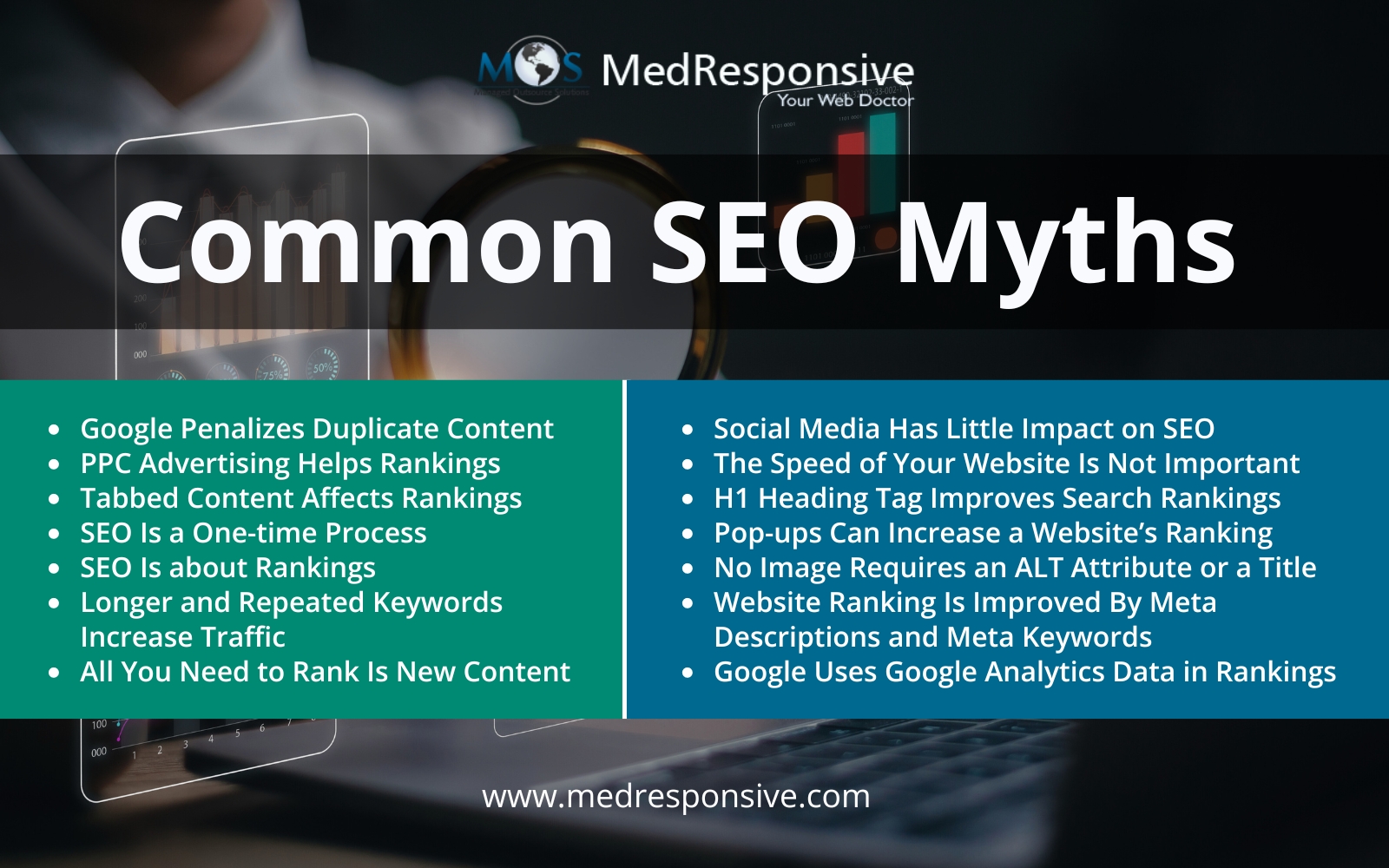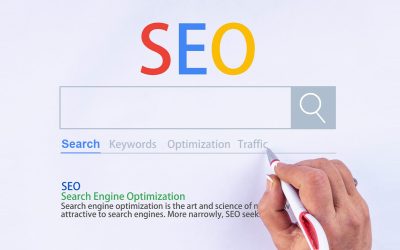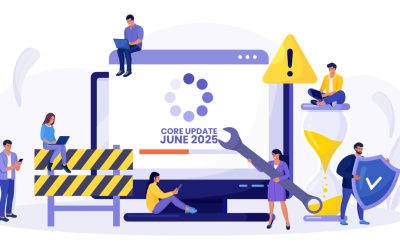As internet use surges, search engine optimization (SEO) is now more crucial than ever for businesses to stay ahead of the game. In fact, many companies are investing in digital marketing services to adopt the latest SEO techniques and trends that fuel business growth.
SEO is a crucial aspect of digital marketing. Comprehending the functions of its diverse components is imperative to make your website more visible, attract more targeted traffic and potentially convert them into customers. SEO has emerged as a valuable tool for business promotion, customer relationship building, and positioning your company as an authority in the field. However, there are several myths surrounding SEO and even the most seasoned SEO expert may get lost when it comes to digital marketing. To create an effective SEO plan and succeed, it’s important to dispel these fallacies and recognize the facts.
Common SEO Myths
Google Penalizes Duplicate Content
Recognizing that duplicate content exists naturally on the internet, Google looks to index the best and most relevant page to prevent users from seeing the same content in search results repeatedly.
In most cases, duplicate content results in similar pages being grouped together in the index and an alternate version of the page being displayed instead—that is, unless the site is trying to manipulate rankings and is entirely composed of duplicate content.
PPC Advertising Helps Rankings
A common belief is that websites that leverage pay-per-click (PPC) advertising will receive preferential treatment from Google. This is not true. Google uses a different algorithm to rank organic search results than it does to determine PPC ad placements. While concurrently implementing SEO and a paid search advertising campaign through Google may help your site for other reasons, it won’t directly raise your ranking.
Tabbed Content Affects Rankings
Another myth is that content hidden behind a tab or accordion will lose some of its value in Google’s eyes.
In-page tabs and accordions are user interface (UI) controls designed to enhance the user experience by organizing content into logical sections. By utilizing tabs, page visitors can easily switch between different views, accessing specific sections of content based on their interests or needs.
If the content is visible in the HTML and the user does not see it when the page loads initially, it does not mean that it is being devalued. As long as the content is accessible to Google and there are no other factors preventing the search engine from viewing the content, it should be weighted equally to content that is not hidden within tabs. Google’s objective is to provide relevant and valuable information to users, so it takes into account all content on the page, regardless of its visibility to the user upon initial load.
SEO Is a One-Time Process
Business owners tend to think SEO only needs to be done once. After optimization, a website begins to show up on search engine result pages.
The fact is that once your website begins to rank, you will need to continue working to keep it there. Google’s dynamic algorithms are to blame for this. One-time SEO is definitely beneficial, and the results are immediately apparent. It will not, however, last very long if there is a lack of upkeep and market competitiveness. Google regularly updates its algorithms in an effort to improve search results. Consequently, your rivals may outrank you if you don’t consistently update your website to take advantage of the new algorithm.
SEO Is About Rankings
A vital ranking factor is figuring out how relevant your website is in addition to having content that is optimized. Conversely, if no one visits your website, it isn’t relevant and your content wasn’t search engine optimized, which means it won’t stick around for very long.
SEO will raise your search engine ranking, but it also requires you to consider the needs and intentions of users. Google focuses on user intent in order to provide more precise and tailored results.The technique of improving a website’s natural search engine ranking is known as search engine optimization. From an on-site SEO standpoint, the title, the meta descriptions, the content pictures chosen, and the keywords used are all crucial on-site SEO elements.
Longer and Repeated Keywords Increase Traffic
Google penalizes websites that use the same keywords over and over again. As a result, if you quit stuffing keywords into your blog entries, your traffic will increase by double. The most crucial phases in the entire SEO process should be keyword research and optimization of selected keywords. While Google AdWords Keyword Planner has been one of the most popular options for a while as SEO developed, there are a variety of other options now. Long-tail keywords and keyword stuffing are not the most important SEO elements; keyword optimization should come first.
However, keep in mind that context is more telling than keywords when it comes to information. It is only now beginning to have a noticeable effect on search results. Google always provides tailored results based on each user’s unique search. It picks only the most pertinent pages from billions of pages it scans.
All You Need To Rank Is New Content
If the content on your website is outdated and not useful for your target audience, it will negatively impact both SEO and the user experience (UX). But creating content that is keyword-rich on a regular basis will not benefit or help anyone trying to improve their SEO. If you use keywords excessively, search engines may penalize you. It’s possible that some content on your website is perfectly fine and just needs a little attention. To enhance your SEO, you can modify web pages, blog posts, and meta tags. Just think about whether adding new headings and subheadings to your blogs or altering the ones you have now would be beneficial. Google looks for compelling headlines on websites that answer users’ queries. Occasionally, a fast evaluation and revision of your content can greatly improve your business’s search engine ranking.
Social Media has little impact on SEO
Engagement on social media by itself won’t affect your SEO.
The purpose of social media is to raise brand awareness. Social media exposes your content to people who should be interested in it, which boosts engagement and website traffic. The shares and links that other people provide your website do have an impact on your Google SERP ranking.
The speed of your website is not important
Slow page loads greatly irritate customers, so you may find it challenging to convert site visitors into paying customers. It might also have an impact on how search engines index the pages on your website.
The H1 Heading Tag Improves Search Rankings
An H1 heading tag is essential and ought to be present on every page. Nevertheless, on-page ranking is not significantly influenced by the H1 tag. It accomplishes more than merely boosting website traffic. It will help you divide and arrange your content more effectively so that users of your website can read it easily. The H1 element, on the other hand, immediately enhances user experience and motivates visitors to visit other pages of your website. It will automatically decrease your website’s bounce rate.
Pop-Ups can increase Website’s Ranking
While not all pop-ups are penalized by Google, you should refrain from using them if they make it impossible for users to access the content, especially on mobile devices. The mobile user experience will be disrupted, for example, if a user accesses your website’s home page and is greeted with a full-screen mobile pop-up that obscures all of the content on the main page and displays other pointless content. That might affect your website’s ranking in search results.
No image requires an ALT attribute or a title
Every picture on your website needs to have a relevant file name and ALT tag. It facilitates search engines’ ability to deduce the subject matter of the photos. As a result, take care to appropriately optimize every single image on your website.
Website Ranking Is Improved By Meta Descriptions and Meta Keywords
This is another SEO misconception. Meta descriptions—brief summaries of a web page— appear in search engine results when a user types in a query. The meta description appears after the title tag and hyperlink to the website. Many people think that it can raise a website’s ranking. The truth is that meta descriptions have little effect on a website’s ranking.
Google Uses Google Analytics Data in Rankings
A popular misconception is that Google uses information from Google Analytics as part of its ranking algorithm to determine a website’s ranking. Webmasters frequently worry that Google will view their site as low-quality and manipulate its ranks if their Google Analytics data is subpar, such as a high bounce rate or low time spent on the page.
It’s actually challenging to take into account Google Analytics data when determining rankings.Google Analytics metrics can help you identify potential reasons for your website’s poor ranking, but they are not always the root of the problem.
There are various myths about SEO. Make sure to verify any information you read online and seek to debunk any myths. Consult a professional or hire an SEO expert to ensure that you understand the proper course of action. The updates should be communicated to you. Finding the latest algorithm updates and adjusting your SEO strategies while focusing on your main responsibilities may seem difficult. If you want your blog to be more visible, concentrate on drawing in regular readers rather than creating content for search engine bots. Get in touch with a reliable provider of organic SEO services to implement the right SEO strategies for your business.
Don’t let misinformation hold you back
Uncover the truth about SEO and propel your business forward.





